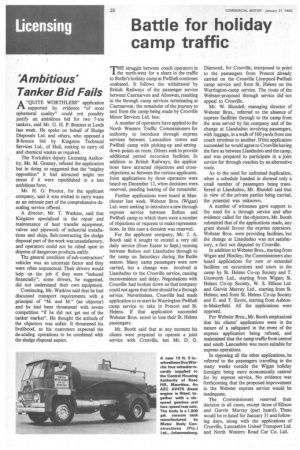Battle for holiday camp traffic
Page 30

If you've noticed an error in this article please click here to report it so we can fix it.
THE struggle between coach operators in the north-west for a share in the traffic to Butlin's holiday camp at PwIlheli continues unabated. It follows the withdrawal by British Railways of the passenger service between Caernarvon and Afonwen, resulting in the through camp services terminating at Caernarvon, the remainder of the journey to and from the camp being made by Crosville Motor Services Ltd. bus.
A number of operators have applied to the North Western Traffic Commissioners for authority to introduce through express services between Lancashire towns and Pwllheli camp with picking-up and settingdown points en route. Others seek to provide additional period excursion facilities. In addition to British Railways, the applications have attracted objections and crossobjections as between the various applicants. Joint applications by three operators were heard on December 13, when decisions were, reserved, pending hearing of the remainder.
Further applications were heard it Manchester last week. Webster Bros. (Wigan) Ltd. were seeking to introduce a new through express service between Bolton and Pwilheli camp to which there were a number of objections or requests to make representations. In this case a decision was reserved.
For the applicant company, Mr. J. A. Booth said it sought to extend a very old daily service (from Easter to Sept.) running between Bolton and Llandudno through to the camp on Saturdays during the Butlin season. Many camp passengers were now carried, but a change wasP involved at Llandudno to the Crosville service, causing inconvenience and delay. Negotiations with Crosville had broken down as that company could not agree that there should be a through service. Nevertheless, Crosville had made application to re-start its Warrington-Pwllheli camp service to take in Prescot and St. Helens. If that application succeeded Webster Bros. stood to lose their St. Helens passengers.
Mr. Booth said that at any moment his clients were prepared to operate a joint service with Crosville, but Mr. D. 0. Diamond, for Crosville, interposed to point to the passengers from Prescot already carried on the Crosville Liverpool-Pwllheli camp service and from St. Helens on the Warrington-camp service. The route of the Webster-proposed through service did not appeal to Crosville.
Mr. W. Blundell, managing director of Webster Bros., referred to the absence of express facilities through to the camp from the area served by his company and of the change at Llandudno involving passengers, with luggage, in a walk of 100 yards from one coach terminus to another. If this application succeeded he would agree to Crosville having the fare as between Llandudno and the camp, and was prepared to participate in a joint service for through coaches by an alternative route.
As to the need for unlimited duplication, when a schedule handed in showed only a small number of passengers being transferred at Llandudno, Mr. Blundell said that in view of the private parties being carried, the potential was unknown.
A number of witnesses gave support to the need for a through service and after evidence called for the objectors, Mr. Booth submitted that of the applications made, any grant should favour the express operators. Webster Bros. were providing facilities, but the change at Llandudno was not satisfactory, a fact not disputed by Crosville.
In addition to Webster Bros., starting from Wigan and Hindley, the Commissioners also heard applications for new or extended facilities on excursions and tours to the camp by St. Helens Co-op Society and T. Unsworth Ltd., starting from Wigan; St. Helens Co-op Society, W. S. Ellison Ltd. and Garvin Murray Ltd., starting from St. Helens; and from St. Helens Co-op Society and E. and T. Eaves, starting from Ashtonin-Makerfieid. All the applications were opposed.
For Webster Bros., Mr. Booth emphasized that his clients' applications were in the nature of a safeguard in the event of the express application being refused, and maintained that the camp traffic from central and south Lancashire was more suitable for express operations.
In opposing all the other applications, he referred to the passengers travelling in the many weeks outside the Wigan holiday fortnight being more economically catered for by express service. No evidence was forthcoming that the proposed improvement in the Webster express service would be inadequate.
The Commissioners reserved their decision in all cases, except those of Ellison and Garvin Murray (part heard). These would be re-listed for January 31 and following days, along with the applications of Crosville, Lancashire United Transport Ltd. and North Western Road Car Co. Ltd.




















































































































